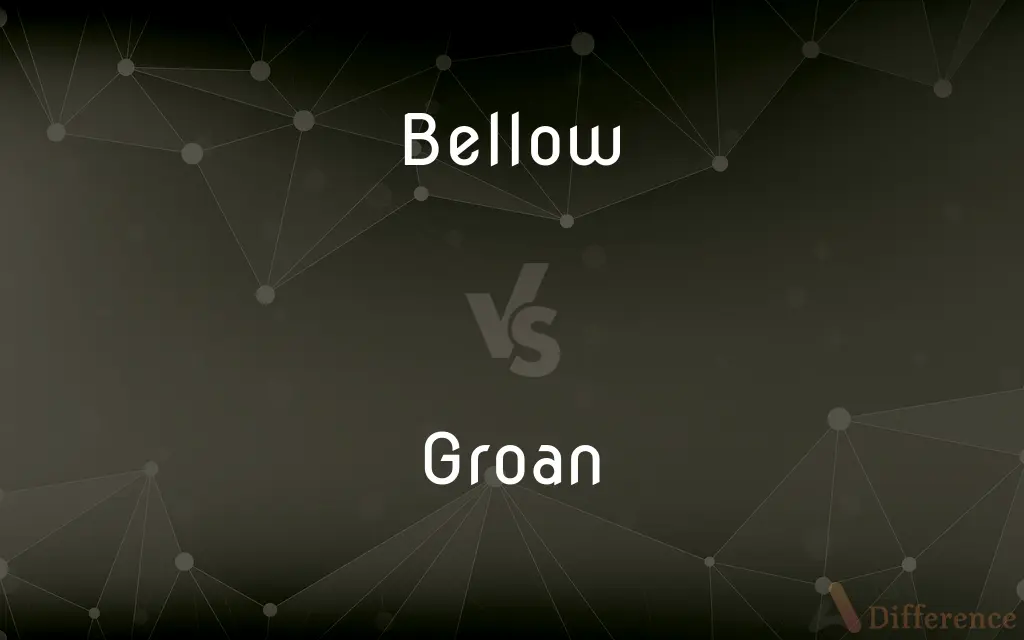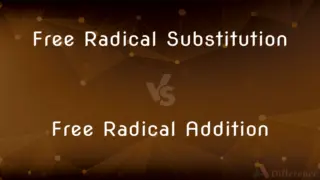Bellow vs. Groan — What's the Difference?
By Tayyaba Rehman — Published on October 20, 2023
Bellow is a loud, deep roar or shout, often due to anger or determination. Groan is a low sound of pain, discomfort, or displeasure. Both are vocal expressions, but they convey different emotions and intensities.

Difference Between Bellow and Groan
Table of Contents
ADVERTISEMENT
Key Differences
Bellow primarily describes a deep and powerful vocal sound, much like the roar of a lion or a determined shout from a human. The sound is assertive and can often be associated with strong emotions like anger, frustration, or even enthusiasm. Groan, in contrast, is softer and conveys feelings of discomfort, pain, or displeasure. It's not typically assertive, but more of a passive expression of unease or distress.
While both bellow and groan are vocalizations, their usages in literature and everyday language evoke different atmospheres and images. A character in a novel might bellow in the heat of battle, displaying dominance or commanding attention. On the other hand, the same character might groan after receiving a blow, indicating pain or weariness. Thus, the context in which they are used often dictates the emotion or sensation they convey.
From a grammatical standpoint, both bellow and groan can function as nouns and verbs. As nouns, they represent the sound or noise made; as verbs, they depict the act of making that particular sound. However, "bellow" often leans towards a louder, more resonant noise, while "groan" is quieter and suggests suffering or annoyance.
In everyday conversations, when someone bellows, it's generally understood that the person is shouting with significant force, often drawing attention to themselves. It's a vocal expression demanding to be heard. Groaning, on the other hand, is more personal and internal. Someone might groan upon hearing bad news or when feeling physical pain, expressing internal discontent more than trying to communicate with others.
Lastly, it's worth noting the versatility of these terms. Both can be used literally, as in actual vocal expressions, or figuratively, to describe sounds similar in nature. A ship might groan under the strain of a heavy load, while a storm might bellow in the distance.
ADVERTISEMENT
Comparison Chart
Primary Meaning
Loud, deep roar or shout
Low sound of pain or displeasure
Linguistic Function
Both noun and verb
Both noun and verb
Connotation
Assertiveness, anger
Discomfort, suffering
Typical Usage
Drawing attention, commanding
Expressing pain, annoyance
Volume
Generally louder
Quieter, subdued
Compare with Definitions
Bellow
The roar of a large animal.
The bellow of the lion sent chills down my spine.
Groan
A sound expressing pain or displeasure.
The groan of the wounded soldier was heart-wrenching.
Bellow
A sound resembling a powerful shout.
The wind's bellow was haunting.
Groan
A low vocalization of discomfort.
He let out a groan after lifting the heavy box.
Bellow
A loud, deep vocal sound.
His bellow could be heard across the entire field.
Groan
To voice a deep, inarticulate sound, as of pain, grief, or displeasure.
Bellow
To shout loudly and deeply.
He bellowed for everyone to get down.
Groan
To make a sound expressive of stress or strain
Floorboards groaning.
Bellow
To make the deep roaring sound characteristic of a bull.
Groan
To utter or express with groans or a groan.
Bellow
To shout in a deep voice.
Groan
The sound made in groaning.
Bellow
To utter in a loud, powerful voice.
Groan
A low, mournful sound uttered in pain or grief.
Bellow
The roar of a large animal, such as a bull.
Groan
A low, guttural sound uttered in frustration, disapproval, or ecstasy.
Bellow
A very loud utterance or other sound.
Groan
A low creaking sound from applied pressure or weight.
Bellow
The deep roar of a large animal, or any similar loud noise.
Groan
To make a groan.
We groaned at his awful jokes.
The wooden table groaned under the weight of the banquet.
Bellow
To make a loud, deep, hollow noise like the roar of an angry bull.
Groan
(figurative) To seemingly creak under the strain of being heavily laden.
Bellow
To shout in a deep voice.
Groan
(obsolete) To strive after earnestly, as if with groans.
Bellow
To make a hollow, loud noise, as an enraged bull.
Groan
To give forth a low, moaning sound in breathing; to utter a groan, as in pain, in sorrow, or in derision; to moan.
For we . . . do groan, being burdened.
He heard the groaning of the oak.
Bellow
To bowl; to vociferate; to clamor.
Groan
To strive after earnestly, as with groans.
Nothing but holy, pure, and clear,Or that which groaneth to be so.
Bellow
To roar; as the sea in a tempest, or as the wind when violent; to make a loud, hollow, continued sound.
The bellowing voice of boiling seas.
Groan
To affect by groans.
Bellow
To emit with a loud voice; to shout; - used with out.
Groan
A low, moaning sound; usually, a deep, mournful sound uttered in pain or great distress; sometimes, an expression of strong disapprobation; as, the remark was received with groans.
Such groans of roaring wind and rain.
The wretched animal heaved forth such groans.
Bellow
A loud resounding outcry or noise, as of an enraged bull; a roar.
Groan
An utterance expressing pain or disapproval
Bellow
A very loud utterance (like the sound of an animal);
His bellow filled the hallway
Groan
Indicate pain, discomfort, or displeasure;
The students groaned when the professor got out the exam booklets
The ancient door soughed when opened
Bellow
United States novelist (born in Canada in 1915)
Groan
A noise resembling a moan.
The old house seemed to groan in the wind.
Bellow
Shout loudly and without restraint
Groan
An expression of annoyance or frustration.
She groaned at the thought of more paperwork.
Bellow
Make a loud noise, as of animal;
The bull bellowed
Groan
To make a low sound due to pain or stress.
The overloaded shelf groaned under the weight.
Bellow
A shout of anger or enthusiasm.
The coach's bellow motivated the players.
Common Curiosities
Which is typically louder, a bellow or a groan?
A bellow is typically louder than a groan.
Are bellow and groan both used as nouns and verbs?
Yes, both words function as nouns and verbs.
How does a bellow draw attention?
Due to its loud and assertive nature, a bellow commands attention.
Can inanimate objects groan?
Yes, in a figurative sense, like a door might "groan" when it's creaking.
Is a groan always vocal?
While commonly vocal, it can also describe figurative or non-vocal sounds.
Is a bellow always angry?
Not necessarily; it can express other strong emotions like enthusiasm.
Can a bellow be positive?
Yes, like a bellow of laughter or celebration.
Do only humans bellow?
No, animals, especially large ones like lions or cows, can also bellow.
Is a groan softer than a moan?
Typically, yes, a groan is a subdued sound, while a moan can vary in volume.
Can both bellow and groan indicate discomfort?
Yes, but a bellow often shows anger while a groan indicates pain or annoyance.
Why might someone groan when hearing bad news?
To express displeasure, disappointment, or emotional pain.
Can a bellow be musical?
In a sense; instruments like horns can produce deep, bellow-like sounds.
When might someone groan in daily life?
Upon feeling physical strain, hearing a bad joke, or facing a tedious task.
Can you groan out of relief?
Yes, a groan can express relief after tension or stress has been lifted.
If someone bellows instructions, are they shouting them?
Yes, bellowing instructions would mean loudly and forcefully shouting them.
Share Your Discovery

Previous Comparison
Tense vs. Participle
Next Comparison
Free Radical Substitution vs. Free Radical AdditionAuthor Spotlight
Written by
Tayyaba RehmanTayyaba Rehman is a distinguished writer, currently serving as a primary contributor to askdifference.com. As a researcher in semantics and etymology, Tayyaba's passion for the complexity of languages and their distinctions has found a perfect home on the platform. Tayyaba delves into the intricacies of language, distinguishing between commonly confused words and phrases, thereby providing clarity for readers worldwide.














































